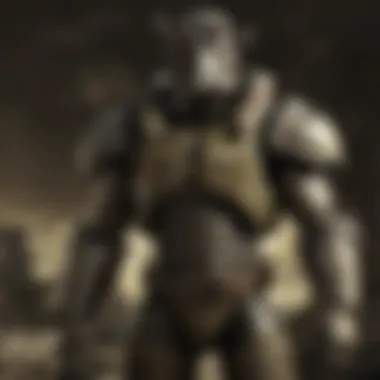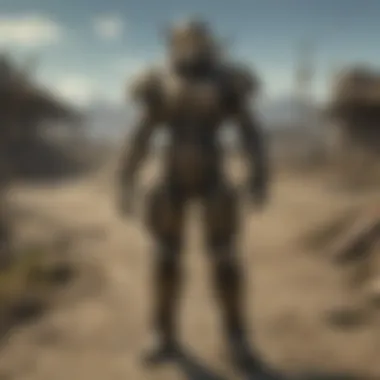Examining Major Flaws in the Fallout Series


Intro
The Fallout series, an expansive universe set in a post-nuclear landscape, has garnered immense popularity over the years. From its richly woven lore to its engaging gameplay, the franchise has captivated gamers and critics alike. However, even a beloved series like Fallout is not without its shortcomings. In this article, we will dissect three significant weaknesses that linger within the franchise, shedding light on gameplay mechanics, narrative inconsistencies, and the development of characters. Understanding these flaws offers an opportunity for reflection among experienced players and newcomers alike, prompting thoughts on how these elements shape the overall gaming experience.
Lore Insights
Overview of the Fallout Universe
The foundation of Fallout's charm lies in its intriguing universe, characterized by a retro-futuristic aesthetic and a vivid exploration of humanity’s resilience amid chaos. Fallout paints a picture of a world devastated by nuclear war, where survivors navigate the remnants of civilization while grappling with their moral choices. Yet, amid the colorful backdrop of the Wasteland, notable weaknesses emerge that undermine the overall impact of the narrative.
Key historical events in the Fallout timeline
The timeline of Fallout is a patchwork quilt of historical events, timelines overlapping in ways that can confuse players. For example, the narrative launch of Vault-Tec and the ensuing Great War is presented through a lens that sometimes fails to clarify the stakes. The connections between events like the rise of the Brotherhood of Steel or the emergence of the Institute can come across as disparate, leading to an understanding that feels a bit pieced together. This can detract from the emotional weight these events should ideally carry.
Deep dive into the backstory of major factions and characters
The lore is littered with interesting factions and personalities, yet their backstories often lack depth and cohesion. The Brotherhood of Steel, for instance, while a staple faction, has undergone notable changes in ideology across different games. This inconsistency leaves players questioning not only the motivations of these factions but also their purpose within the broader narrative. As a result, the richness of the lore can feel diluted, impacting the immersion that players seek in a story-driven game.
Gameplay Analysis
Shortcomings in gameplay mechanics
When it comes to gameplay, Fallout has its share of thrills but also an array of frustrations. Combat mechanics, particularly in recent installments, have faced criticism for becoming clunky and less satisfying. For example, in Fallout 76, many players reported that the shooting mechanics felt unrefined and lacked the impact one would expect in a post-apocalyptic shooter. This can lead to a disjointed experience, where the connection between player skill and in-game outcomes feels tenuous.
Narrative inconsistencies in quests
Quests throughout the Fallout franchise are often hit-or-miss, a mix of engaging narratives and convoluted tasks. The quest structure in Fallout 4 demonstrates this well, where the vibrant world may be overshadowed by quests that lead to conclusions feeling rushed. Some storylines fizzle out without a satisfying resolution, leaving players with a sense of dissatisfaction and a missed opportunity for deeper storytelling.
Character Development
A closer look at iconic characters
The Fallout universe is peppered with iconic characters who add flavor to the wasteland. However, character development often takes a backseat. Characters like Piper or Hancock have moments of brilliance but can struggle with inconsistency. Their arcs sometimes feel forced or overshadowed by the player's choices. Moreover, this affects how players connect with characters and their evolution throughout the game, potentially leading to a sense of flatness.
Relationships and their implications
Building relationships with companions is a significant aspect of the Fallout experience. However, these interactions have been criticized for lacking depth. The emotional connections players forge with these characters can falter when dialogue options seem limited or don’t reflect the player's actions appropriately. This creates a barrier to genuine engagement, leaving some players wishing for deeper, more intuitive interactions.
Culmination
In examining the Fallout franchise, it’s apparent that despite its many attributes, there are pronounced weaknesses that affect its overall narrative and gameplay experience. From inconsistencies in lore and quest narratives to character development that can feel superficial, these elements suggest a need for greater cohesion and refinement. By unpacking these flaws, we invite further discourse among the Fallout community, prompting both reflection and hope for future installments that improve on these facets.
Intro to the Fallout Franchise
The Fallout franchise stands as a cornerstone in the realm of role-playing games (RPGs), intertwining a striking post-apocalyptic narrative with player freedom and exploration. As players venture through a retro-futuristic wasteland, they are often met with complex stories, engaging gameplay, and moral dilemmas that challenge their values at every turn. Understanding the importance of this franchise is critical for dissecting its strengths and, notably, its weaknesses.
From its inception in the late 1990s, Fallout has established a unique identity characterized by its choice-driven gameplay and richly detailed environments. However, beneath that nostalgic charm lies a tapestry woven with flaws that can hinder player immersion and enjoyment. Notably, the franchise's evolution over the years—shifting from isometric gameplay to first-person perspectives—has shaped not only its appeal but also pointed out areas that require scrutiny.
As we delve deeper into gameplay mechanics, narrative inconsistencies, and character development, one must acknowledge how these elements impact both seasoned players and those new to the franchise. Each title offers a different flavor, but recurring issues can create barriers that detract from the overall experience. By unearthing these weaknesses, we engage in critical reflection, thereby enhancing our appreciation of what Fallout has contributed to the gaming world and what it can strive toward in future installments.
Historical Context
The roots of Fallout can be traced back to 1997 when its first release captured gamers’ imaginations. Set in a world devastated by nuclear war, the game introduced the S.P.E.C.I.A.L. system, allowing players to craft unique characters and make decisions shaping their journey. The intricate worldbuilding and moral ambiguity set the tone for future iterations. The release of Fallout 2 solidified its reputation, expanding on the original's mechanics while introducing a more in-depth narrative.
In the early 2000s, the franchise underwent a seismic shift with Fallout 3, transitioning to a 3D first-person view. This transformation broadened its audience but also raised questions about the fidelity to its predecessor's original formula. The advent of this new era marked a shift in the gaming landscape, and the impact of these changes is reflected in subsequent titles.
Cultural Impact
Fallout's influence extends far beyond its gameplay. The franchise echoes the fears and anxieties of contemporary society, paralleling concerns around war, technology, and environmental degradation. It blends satire with social commentary, providing a unique lens through which players can examine their world.
- Enduring Themes: The notion of survival in a post-apocalyptic landscape resonates deeply. Players are thrust into morally ambiguous situations, prompting them to grapple with complex decisions that can lead to life or death.
- Community Engagement: Reddit and other platforms have become hotbeds for discussions, theories, and shared experiences related to the franchise. Fans not only critique each iteration but also celebrate its quirks and features.
The cultural significance of Fallout lies in its ability to provoke thought and evoke emotions, offering players both a mirror and a window into their own lives. This introspection is not merely a side effect; it's a testament to the franchise's ability to create lasting connections with its audience.
"Fallout reminds us that choices matter; they define our journey in the wasteland just as they do in real life."


This exploration into the historical context and cultural impact sets the stage for a deeper investigation into the franchise’s notable weaknesses. By unpacking these aspects, we can fully comprehend the intricate dance between triumphs and shortcomings, adding layers to our understanding of the Fallout series.
First Weakness: Gameplay Mechanics
The gameplay mechanics of the Fallout franchise are a fundamental pillar that supports the overall player experience. However, these mechanics also expose several critical weaknesses that can sometimes diminish the richness and depth players expect from a post-apocalyptic open-world game. When delving into gameplay mechanics, one must examine both the combat systems and the inventory management, as both are key players in shaping the interaction between the user and the world.
Combat System Limitations
The combat system in Fallout has always been a topic of discussion among fans and critics alike. While it aims to provide a unique blend of real-time action and strategic planning, its limitations can leave players feeling somewhat frustrated.
Balancing Issues
Balancing issues in the combat system can lead to a skewed experience for players. This encompasses everything from weapon strengths and weaknesses to enemy difficulty levels. When a particular weapon feels overwhelmingly powerful or, conversely, useless against enemies, it disrupts the flow of gameplay.
A key characteristic of these balancing issues is the inconsistency observed across different games in the series. For example, some weapons may feel overpowered to the point of trivializing encounters, making certain parts of the game far too easy, while other situations may feel frustratingly difficult. This inconsistency can cause a player’s immersion to falter when they find themselves equipped with a seemingly useless firearm against a wave of aggressive raiders.
The unique feature of balancing issues in Fallout is that it challenges players to adapt. While this idea of adaptability might sound appealing, it often leads to a sense of randomness in confrontations, where players might need to rely on luck rather than skill. In essence, it can be both a disadvantage and a point of interest, giving rise to a polarized player experience.
AI Behavior Flaws
Another pressing element of the combat system is the AI behavior flaws. The NPC companions and enemies often exhibit patterns of erratic behavior that can detract from immersion. In some cases, enemies behave in a way that defies logic. For example, a fierce super mutant might stand still, firing at a wall, instead of engaging the player head-on.
A key characteristic of AI behavior issues is how these flaws not only affect combat but also the narrative. If an anticipated fight turns into a comical display of incompetence rather than a serious challenge, it can undermine the tension and seriousness that the story tries to convey.
In this context, the unique feature lies in the unpredictability AI introduces to gameplay, leading to unexpected moments. However, this unpredictability can frustrate players who expect a serious challenge and find themselves instead laughing at a glitch rather than fighting for survival.
Inventory Management Challenges
Inventory management is another crucial aspect that often draws ire among veterans and newcomers to the Fallout franchise. From its user interface quirks to the weight constraints imposed on items, this factor can contribute to a less than satisfactory gaming experience.
User Interface Frustrations
User interface frustrations stem from the complexity and clutter found in inventory management systems. The menus are sometimes cluttered and unclear, making it difficult for players to find the items they need quickly. When looking to grab some stimpaks in the heat of battle, a fast-paced game can quickly turn sluggish if players are sifting through a labyrinth of items that don’t seem to want to cooperate.
A key characteristic of these frustrations is the learning curve associated with the inventory system. For new players, even simple actions can become time-consuming battles against confusing menus. In this sense, while familiarity can breed efficiency, newcomers often feel like they are swimming against the tide.
The unique feature of the inventory frustrations is that they evoke an emotional response from the player. Getting trapped in a menu during an ambush can lead to moments of sheer panic, pulling players out of the immersion of post-apocalyptic action into the frustration of clunky controls.
Weight Limit Constraints
Weight limit constraints introduce yet another layer of complexity into the gameplay. Players can only carry so much, forcing tough choices about what items to keep and what to discard. This system can feel restrictive, especially when players find themselves on the brink of death and unable to carry vital resources.
A key characteristic of weight limits is that they encourage strategic thinking. Players must consider each item’s value against its weight, often leading to tough decisions that can drastically effect gameplay. While it may seem beneficial for encouraging a more thoughtful approach to resource management, it can also lead to moments of irritation when players find essential items they would like to keep but cannot.
There’s a unique feature related to these constraints that can be beneficial; it can lead to emotional storytelling around resource scarcity and survival. However, the drawbacks are apparent when players feel overwhelmed by the limitations placed on them, potentially causing frustration when encountering critical gameplay moments.
Overall, the mechanics underpinning gameplay in Fallout present both strengths and weaknesses. While they are designed to create engaging experiences, finding the balance between challenge and playability remains a significant hurdle for players.
Second Weakness: Narrative Inconsistencies
Narrative inconsistencies within the Fallout franchise are not just minor flaws; they often lead to substantial player dissatisfaction. When players engage with a fictional universe as rich as Fallout's, they expect a narrative that is cohesive, immersive, and compelling. Yet, several titles in the series struggle with storytelling continuity, resulting in a fragmented experience that can leave fans scratching their heads. By diving into these narrative gaps, we can understand their effects on player engagement and the overall story arc of the franchise.
Plot Holes and Disregarded Arcs
Unresolved Storylines
Unresolved storylines are a plague that haunts Fallout games, making it feel like a cold case left unsolved. Fans often uncover intriguing plots or character developments that seem promising but ultimately lead to nowhere. For instance, the fate of certain factions or key NPCs might be introduced only to vanish, leaving players yearning for closure. This lack of resolution can frustrate seasoned players who get invested in the story, desiring a sense of completion.
The key characteristic of unresolved storylines is their potential for tension and intrigue; they can hook players in and latch onto their curiosities. However, this becomes a disadvantage when it's not followed through. Players appreciate engaging narratives with a satisfying payoff and being left in limbo can feel like having an albatross around their necks rather than an engaging experience.
Disjointed Character Paths
Disjointed character paths further compound the narrative issues, creating a patchwork of stories that don’t flow together seamlessly. For example, a character's journey might feel like a jigsaw puzzle but with pieces that don’t quite fit. Where players expect development and depth, they are often met with inconsistent arcs. These characters may change motivations or behaviors abruptly, confusing players who seek a deeper emotional connection to the cast.
The unique feature of disjointed character paths is that they can showcase a multitude of perspectives. However, this diversity can also dilute the narrative, making it challenging for players to engage with one coherent theme. When characters’ decisions and growth do not align with the game's larger narrative, it leaves players feeling detached, unsure of what to invest their emotional energy in.
Tone and Thematic Disparities


Shifts in Narrative Focus
Shifts in narrative focus within Fallout titles can feel like a detour on an already complicated journey. What starts as a sober exploration of post-apocalyptic survival might suddenly transform into a quest filled with absurdist humor, leaving players blinking in confusion. A prime example of this is when a serious subplot intertwines with a comedic element without any clear transition. These shifts can, at times, provide levity but also create a jarring dissonance that disrupts immersion.
The central characteristic of these shifts is their unpredictability; they can shock players out of complacency and provoke thought. Yet, while it can be a beneficial narrative device in moderation, too frequent or poorly executed changes can lead to frustration. Players find themselves caught between what they expect and what is delivered.
Conflicting Themes
Conflicting themes are another significant issue that Fallout grapples with, resulting in mixed signals about what the series stands for. Themes of survival, morality, and choice often clash against whimsical undertones or satirical elements. The juxtaposition can be jarring; in one moment, you might find ethics at the forefront, while the next is filled with over-the-top absurdity.
The unique feature of these conflicting themes is their ability to provoke discussion, allowing for varied interpretations among players. However, this comes with its own set of challenges, as it risks alienating players who prefer a consistent thematic experience. While it has the potential to enrich the narrative, the vast contrasts can also detract from the emotional weight of the game.
"A coherent narrative facilitates player immersion; when it falters, players often step back, questioning their investment in the world."
Overall, narrative inconsistencies in the Fallout franchise pose significant challenges that impact how the games are experienced. The unresolved storylines, disjointed character paths, and tonal shifts paint a picture of a franchise struggling to find its footing in storytelling. This examination shows that addressing these gaps—potentially through careful planning and player feedback—could elevate the franchise's narrative to new heights and enrich player engagement.
Third Weakness: Character Development Issues
In the realm of the Fallout franchise, character development serves as a cornerstone of player engagement. The richness of interactions and narratives hinges largely on well-crafted characters who feel genuine and immersive. However, the shortcomings in this area pose significant challenges to players seeking a deeper connection with the game world. An exploration of these character development issues reveals key facets that detract from the overall experience.
Lack of Depth in NPCs
Repetitive Dialogue
One notable aspect of character development is the issue of repetitive dialogue among NPCs. Often, players encounter the same phrases and exchanges, making interactions feel choreographed rather than organic. This redundancy contributes to a sense of monotony, leaving gamers feeling like they are sticking to a script rather than engaging in a lively conversation.
Key characteristic: The predictability of dialogues can lead to disengagement. Repetitive phrases not only reduce immersion but also make it tough for players to forge meaningful connections with the characters.
Unique feature: The over-reliance on a limited dialogue pool has disadvantages. While it may save development resources, it ultimately constrains the storytelling potential and detracts from character complexity. Players yearn for varied and dynamic interactions, which can enhance immersion and encourage exploration of the game's narrative depth.
Underdeveloped Backstories
Another glaring deficiency lies in the underdeveloped backstories of many NPCs. When characters lack fleshed-out histories or motivations, the narrative landscape can feel thin. This deficiency not only affects the players' investment in the game but can also diminish the impact of pivotal plot points.
Key characteristic: The absence of rich backstories makes it challenging for players to relate to the characters emotionally. Characters that feel one-dimensional can lead to a disconnect, sowing seeds of apathy among players.
Unique feature: Although a minimalistic approach might suggest a focus on the core storyline, it often results in missed opportunities for extensive lore and character arcs that could enhance the overall narrative. Players are often drawn to detailed character lore, as it can evoke empathy, heightening their excitement in exploring the world.
Protagonist's Agency Limitations
Player Choices Impact
Moving beyond NPCs, protagonist agency is another crux of character development. Fallout's games often tout a focus on player choice, but many find the effectiveness of these choices limited. For an interaction to feel meaningful, players expect their decisions to sway the narrative arc, affecting outcomes significantly.
Key characteristic: When players perceive their choices as superficial, the impact on the game world appears diminished. It's crucial for players to feel that they are not just going through the motions but actually shaping the storyline through their actions.
Unique feature: A limited choice framework can lead to feelings of frustration among players, who may discover they cannot affect crucial aspects of the storyline. This can ultimately lead to apathy toward the protagonist’s journey, diminishing the player's investment in the unfolding narrative.
Narrative Constraints
Furthermore, narrative constraints have a significant role in diminishing character agency. The linear structure of some storylines often imposes restrictions on how characters evolve, leaving little room for players to craft unique paths.
Key characteristic: These constraints might make it seem as if the game is forcing players down a predetermined path, stripping away the essence of choice that the franchise intends to uphold.
Unique feature: In dropping the ball on narrative flexibility, developers may inadvertently sideline the potential for rich character growth. Players often desire multifaceted plots that allow exploration, varied outcomes, and meaningful arcs.
Summary: The issues surrounding character development in the Fallout franchise highlight the importance of well-rounded NPCs and player agency. Addressing repetitive dialogue, underdeveloped backstories, and limited narrative flexibility can rejuvenate player engagement and investment in the franchise's rich lore and storytelling prowess.
Comparative Analysis with Other Franchises
Comparative analysis holds signifcant weight in understanding the Fallout franchise, especially when put alongside its competitors. By taking a closer look at how other game series tackle issues like gameplay and narrative, one can better understand where Fallout tends to stumble. It’s not just a matter of evaluating faults; it’s more about recognizing successful elements that could be lessons for improvement. With the rise of many engaging titles, it becomes clear that player expectations evolve, and the Fallout series must adapt accordingly, ensuring it remains competitive amidst a saturated gaming landscape.
Strengths of Competing Series
Engaging Gameplay
Engaging gameplay is what pulls players into the universe of a game and keeps them coming back to it. One of the standout examples of engaging gameplay is found in The Witcher 3: Wild Hunt. The depth of choices and the impact those choices have on world events create a truly immersive experience. In contrast, certain aspects of Fallout’s gameplay often seem too reliant on formulas established in previous titles, rendering it less innovative. Besides, when one compares the fluidity of combat systems in franchises like Doom, which offers high responsiveness and intensity, Fallout appears slower and less dynamic. This can be a drawback for players looking for exhilarating encounters in a post-apocalyptic setting.


Key characteristic of engaging gameplay is the way a game draws players into its narrative. The Witcher 3 thrives on this aspect by giving players meaningful choices that shape both gameplay and storylines. This results in a sense of ownership over the game’s world that many feel makes for a richer experience. Fallout could benefit from similar methods, introducing more options that significantly affect outcomes and consequences in its sprawling narratives.
However, while tightly crafted gameplay is clearly beneficial for engagement, it is not without its own pitfalls. Overemphasizing mechanics can sometimes lead to neglecting story depth, as is the case in some action-heavy titles that prioritize combat over character development.
Robust Character Development
Robust character development can sway player attachment. Titles like BioShock Infinite exhibit characters with clear motivations and convincing backstories, allowing players to forge emotional connections. In Fallout, however, many Non-Playable Characters remain somewhat flat, presenting little more than quest-givers. This can create a disconnection between players and the world, prompting them to see the characters as mere tools rather than integral parts of the narrative.
One important characteristic of robust character development is the focus on growth and change. Characters that evolve—either for better or worse—through meaningful experiences resonate more profoundly with players. In Fallout, though, many NPCs can feel static in their arcs, which contributes to the general sense of lost opportunity in storytelling.
While it is appealing to have diverse character creation options in Fallout, the relationships players build with core characters should hold similar importance. More layered narratives would potentially allow players to explore deeper emotional landscapes, drawing them into the world in a way that mere customization might not achieve.
Lessons for Fallout's Future
Incorporating lessons gleaned from competing series provides a roadmap for Fallout’s advancement. It is important to recognize that even small improvements in gameplay and character narratives can drastically shape player experience.
Implementing Game Mechanics
Implementing game mechanics effectively can elevate gameplay experiences significantly. The seamless integration seen in games like Dark Souls ensures players are both challenged and rewarded, laying down a foundation for discovery and skill. Fallout’s reliance on its established mechanics sometimes leads to stagnation, which can alienate players. The lessons vary—from intricate crafting systems to precise combat flow—there’s much to explore. Especially by taking cues from survival mechanics found in games like Rust, Fallout can tap into fresh gameplay elements that create urgency and immersion.
Another unique feature of effective game mechanics involves balancing complexity with accessibility. It is essential for a game to stunt its mechanics so they don’t overwhelm new players while still providing enough depth for veterans to engage with. Fallout's mechanics often lean toward cumbersome, leading to frustrations in inventory or combat experiences. Addressing these concerns is not just beneficial; it is necessary to ensure future titles can resonate with a broader audience.
Enhancing Narrative Cohesion
Enhancing narrative cohesion is vital for any franchise’s sustainability. A well-structured narrative keeps players involved—if players can connect with a story, they are more likely to invest time in exploration. Franchises like God of War have demonstrated how dialogue and storytelling can serve as powerful tools for immersion. Fallout tends to jump between ideas and tones in ways that can feel disjointed.
An important characteristic of narrative cohesion is consistency. When a narrative’s themes and tones align, players can become more engaged and captivated by the story unfolding. Fallout's world is unique and textured, but inconsistencies can lead to confusion.
Taking lessons from competitors on developing a focused narrative framework could transform how Fallout projects its stories. Characters with interconnected arcs—who influence one another—can create a vibrant, believable universe where decisions carry weight and consequences. In practice, integrating this into Fallout could result in a more nuanced player experience, enriching the journey through the Wasteland.
Community Response and Critique
The Fallout franchise has a passionate and vocal community, and the response from players is packed with diverse perspectives. Understanding this community response is essential not only for grasping the impact of gameplay choices but also for recognizing how player critiques have the potential to influence the franchise’s direction. When players engage in discussions, they often share their thoughts on issues stemming from gameplay mechanics, narrative arcs, or character development. This engagement sheds light on player expectations and concerns, highlighting the intricate relationship between developers and their audience.
Fan feedback serves as a treasure trove of insights. By listening closely to discussions, developers can gauge what resonates with players and what falls flat. This two-way communication plays a critical role in shaping how the game evolves over time. A keen understanding of this dialogue can lead to better games in the future.
Fan Discussions and Reactions
Fallout’s community discussions can be found in various forums, including Reddit and other social media platforms. Players come together to dissect the strengths and weaknesses of the games, often leading to heated debates. Some fans passionately defend the series, citing its unique world-building and engaging narratives, while others raise concerns over the flaws previously mentioned, such as gameplay mechanics or story inconsistencies. The discussions often touch on specific features that have either enhanced or diminished their playing experience.
For example, in many Reddit threads, you might find users lamenting the cumbersome inventory management system that can feel like a chore, while others argue about the charm it brings to resource management.
"I can appreciate the grind, but sometimes I wish I didn’t have to micro-manage everything just to explore,” one Reddit user noted in a discussion about managing inventory in Fallout 4.
Many players underline the importance of player agency as they build their characters. They point out where the role-playing aspects get derailed by poor story cohesion or awkward dialogue trees. Posts filled with player critiques become insightful snapshots of collective frustration and enthusiasm and drive conversations around how the franchise could improve.
Influence of Feedback on Game Development
The feedback from the community doesn’t just vanish into thin air; it often finds its way back into the development cycle of future titles. When developers go through forums and social media, they can glean valuable information on what players want, what they appreciate, and what drives them nuts. This kind of crowd-sourced feedback isn’t just useful; it can sometimes be the difference between a lackluster installment and a franchise game-changer.
For example, after the lukewarm reception of Fallout 76 at launch, player criticisms regarding bugs and gameplay mechanics prompted a series of patches and updates. Developers have harnessed the collective player experience to refine their product, demonstrating a willingness to adapt based on community response.
In summary, understanding how the community critiques the Fallout franchise adds a layer of depth to our exploration of its weaknesses. From fandom discussions to actionable feedback, players contribute significantly to shaping the franchise’s future, creating an ongoing dialogue that makes the game much livelier and ever-evolving.
The End
As we conclude our exploration of the Fallout franchise, it's paramount to reassess its numerous contributions and the path it has forged in the gaming landscape. The series, while lauded for its expansive worlds and immersive lore, is not without its shortcomings. This examination of three significant weaknesses—namely, gameplay mechanics, narrative inconsistencies, and character development issues—offers a meticulous lens through which to evaluate the overall player experience. Through these critiques, we can truly grasp the intricacies of what makes this series both beloved and, at times, frustrating.
Reassessing the Fallout Series
The heart of the Fallout universe pulsates with rich storytelling and a post-apocalyptic charm that many fans cherish. However, re-evaluating the series uncovers areas that require attention. For instance, the combat system limitations and various narrative plot holes hinder the potential of an otherwise captivating saga. Players often find themselves immersed in a world teeming with possibilities, only to confront frustrations stemming from lackluster AI behavior or unfathomable choices that lead to unresolved storylines.
To truly continue the legacy of Fallout, we must recognize the need for depth, both in game mechanics and character arcs. Engaging discussions within the community reveal that many players desire a return to the roots—where decisions held weight and every action felt meaningful. By fostering this dialogue, we can pave the way for a more cohesive and engaging experience, reminding both developers and players of the aspirations that this series embodies.
Future Directions for Improvement
Looking forward, the Fallout franchise stands at a crucial crossroads—success hinges on its ability to adapt and evolve. Here are a few ideas worth considering:
- Refining Gameplay Mechanics: By addressing the inventory management issues and enhancing the combat system, developers can create a smoother experience that captivates potential newcomers while satisfying seasoned veterans.
- Strengthening Narrative Cohesion: Streamlining plotlines and focusing on player impact can enhance the overall storytelling process. Clear paths that resonate with player choices will likely create a richer engagement.
- Deepening Character Development: A well-rounded cast with meaningful backstories and dynamic interactions could transform NPCs from mere background characters into memorable companions.
These steps not only reverberate with the desires of the existing fanbase but also open doors for attracting new players eager to experience what Fallout has to offer.
In summary, while the Fallout series may have its flaws, the potential for reinvention is vast. Embracing feedback and actively addressing these weaknesses will undoubtedly carve a brighter future for the franchise, ensuring it resonates for generations to come.







